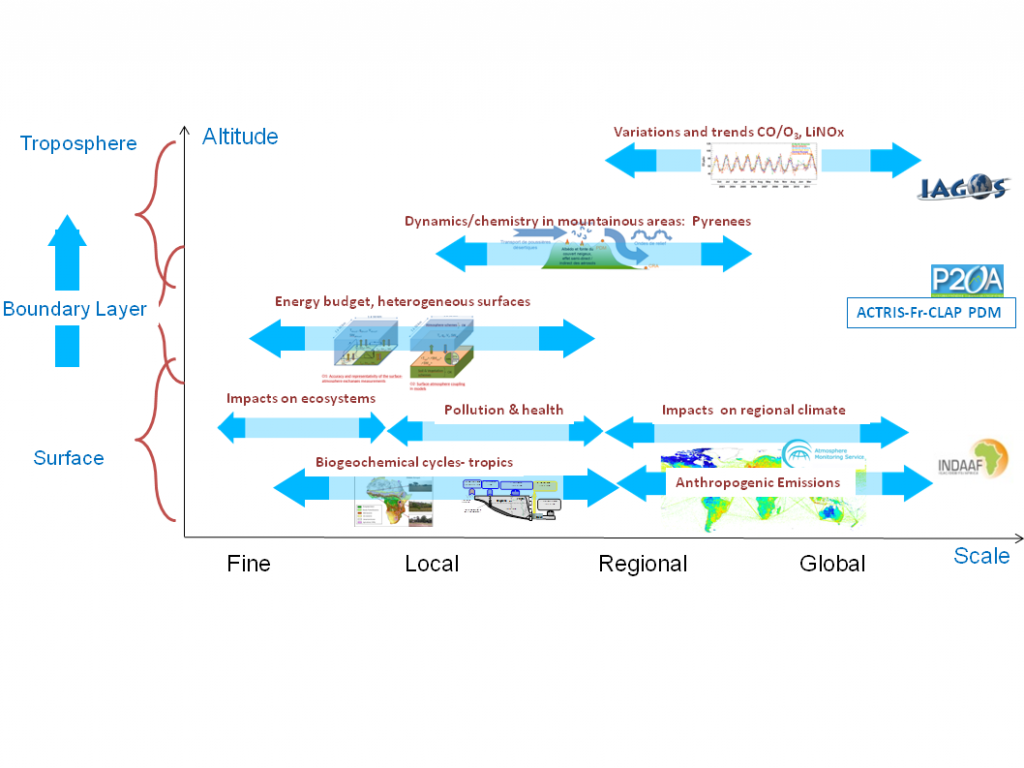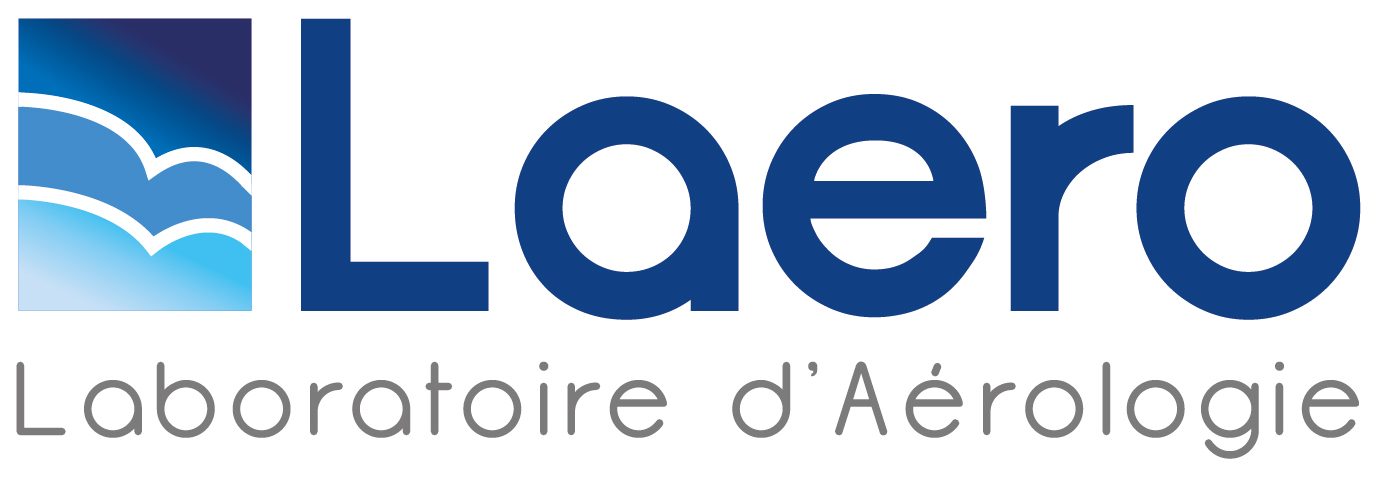
The topics covered in the LEETCHIE group address the interactions between the earth’s surface and the atmosphere, and their influence on the chemical composition of the atmosphere and the dynamics. These studies are based on in-situ measurements (turbulence, dynamics, concentrations/emissions/deposits of gaseous and particulate compounds), satellite measurements, and 1D to 3D modelling (LES, global and regional CTM modelling, regional climate modelling, surface modelling and bio-geochemical processes).
Through the topics covered, we will study the processes of heat exchange, water vapour and chemical compounds at different spatial and temporal scales, to quantify and qualify the impacts of these exchanges in the troposphere from a chemical and dynamic viewpoint. These topics will be supported by data from the INDAAF National Observation Services, SNO CLAP-PDM, the P2OA Instrumented Site under the patronage of the ACTRIS Research Infrastructure (RI) and the IAGOS RI), to which a common approach will be applied, in particular within the framework of the dedicated transverse axis.
Composition of the team:
9 engineers and technicians (Yannick Bezombes, Romain Blot, Jean Marc Cousin, Corinne Galy-Lacaux, Eric Gardrat, Eric Leflochmoen, Philippe Nedelec, Maria Dias-Alves Océane Lenoir)
16 researchers and lecturer researchers (Brice Barret, Claire Delon, François Gheusi, Claire Granier, Corinne Jambert, Jean-François Léon, Cathy Liousse, Fabienne Lohou, Marie Lothon, Céline Mari, Véronique Pont, Bastien Sauvage, Dominique Serça, Fabien Solmon, Valérie Thouret, Pierre Tulet)
9 people under other contracts (Yasmine Bennouna, Florian Brunet, Hannah Clark, Thierno Doumbia, Narivelo Herizo, Hugo Merly, Alana Moore, Julie Patuel, Alban Philibert, Pawel Wolff).
PhD students :•Fredi Agbohessou (2021-2024), Laurence Delville (2022-2025), Samira Elgdachi (2021-2024), Thai Huang (2020-2024), Mathilde Jomé (2021-2024), Thibault Lebourgeois (2021-2024), Estelle Ndengue (2021-2024), Adou Niamien (2023-2026), Arsène Ochou (2021 – 2024), Anaïs Tilhac (2022-2025), Jean Yapo (2023-2026), Marie Yapo (2023-2026), Eric Yao (2021-2025), Moussa Zouré (2024-2027).
Topic 1: Surface-atmosphere interactions in natural and anthropogenic environments
The study of heat exchange processes, water vapour and chemical compounds at the local area scale are essential to improve our understanding of fine-scale processes, and thus propose appropriate and validated parameterizations to meteorological and climate models. On a regional and global scale, the determination of exchanges and emissions of chemical compounds (and their inventories) is crucial for modelling the chemical composition of the atmosphere. Surface heterogeneities:
- Surface heterogeneity (Fabienne Lohou, Marie Lothon)
- Orographic ventilation (François Gheusi)
- Carbon and nitrogen biogeochemical cycle
- Greenhouse Gas Emissions (GHG) (Dominique Serça)
- Biogenic Volatile Organic Compounds (VOC) emissions (Corinne Jambert)
- Nitrogen cycle in Africa (Claire Delon, Corinne Galy-Lacaux, Dominique Serça)
- Anthropogenic emissions (Claire Granier)
- Anthropogenic emissions in Africa (Cathy Liousse)
- Industrial Plumes (Jean François Léon)
Topic 2: Impacts of surface-atmosphere exchanges on dynamics, chemical composition and the environment: Variability and trends
Chemical compound exchanges and the surface energy balance influence the chemical composition of the troposphere, as well as atmospheric dynamics. The LEETCHIE team is studying the influence of the surface in key regions of the globe, particularly in the Pyrenean massif, where there are still many uncertainties about the effect of the relief on the ventilation of the lower layers.
On a larger scale, the LEETCHIE team will study the distribution of chemical species from the surface to the upper troposphere, influenced by chemical dynamics and transformations. The role of tropical regions, particularly West Africa, in this distribution is crucial, and still poorly known due to the lack of targeted studies. The LEETCHIE team proposes targeted studies in West Africa to assess the role of emissions and deposition of chemical and particulate compounds on typical ecosystems, and also on human health in different regions of the world.
- Direct and indirect effects of aerosol in the Pyrenean massif (Véronique Pont)
- Anthropization of tropical regions (Brice Barret, Bastien Sauvage)
- O3 and tropospheric CO variability and trends (Brice Barret, Bastien Sauvage, Valérie Thouret)
- Modelling aerosol interactions – climate (Fabien Solmon)
- Nitrogen budget and trends in Africa (Claire Delon, Corinne Galy-Lacaux, Dominique Serça)
- Health impact of emissions
- Sustainable Cities in Africa (Cathy Liousse)
- Machine learning and emission scenarios (Fabien Solmon, Claire Granier)
Topic 3: Science and Services through Coupled Research Infrastructure (RI) Data Analysis ACTRIS-Fr, IAGOS, ICOS-Atmosphere)
The LEETCHIE team is heavily involved in the coordination of SNO and SI components ACTRIS-FR, RI IAGOS and CAMS through the Service Level Board (SLB), CAMS-81 (Global and regional emissions), and CAMS-84 (Global and regional a posteriori evaluation and quality assurance). The activities of the team will be carried out in the future structure of Copernicus and CAMS, where the RI IAGOS and ACTRIS have a big role to play to strengthen the science-service links essential for our topics with strong societal stakes. The team intends to define general objectives, new services for users and a common experimental strategy, to address and cross-reference data from these infrastructures, and recommend ideas for bringing together the three RI in the atmosphere domain: ACTRIS, IAGOS and ICOS. In addition, the team is involved in the IASI and IASI-NG missions and provides global CO and O3 data over long periods, complementary to the IAGOS series.
